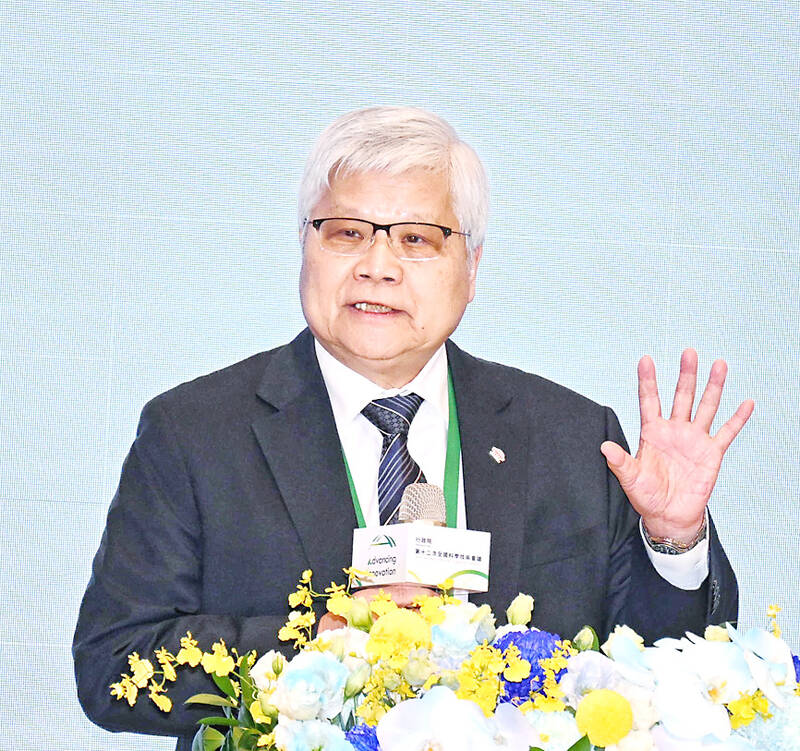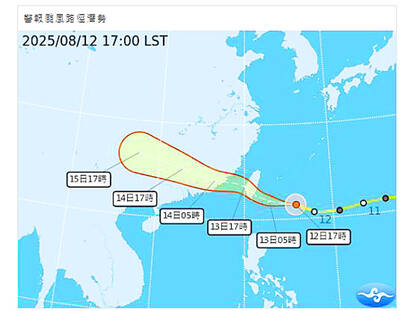Multifunctional service robots could be the next new area in which Taiwan could play a significant role, given its strengths in chip manufacturing and software design, Taiwan Semiconductor Manufacturing Co (TSMC, 台積電) chairman and chief executive C.C. Wei (魏哲家) said yesterday.
“In the past two months, our customers shared a lot of their future plans with me. Artificial intelligence [AI] and AI applications were the most talked about subjects in our conversation,” Wei said in a speech at the National Science and Technology Conference in Taipei.
TSMC, the world’s biggest contract chipmaker, counts Nvidia Corp, Advanced Micro Devices Inc, Apple Inc and Tesla Inc among its clients.

Photo: Fang Pin-chao, Taipei Times
“In my opinion, we [Taiwan] can harness our strength in the AI area. We have good chip design houses capable of designing all sorts of products. We have good technologies in chip manufacturing, chip packaging and data center production, allowing us to play a central role in the AI sector,” he said.
Among AI applications, versatile service robots would be the next trend, Wei said, based on information TSMC has gleaned from its customers.
“I just talked to the world’s richest guy the other day. He told me [developing] versatile robots is the direction he is striving toward, not cars,” he said. “I asked him what worries him the most about developing such robots; he said lack of chip supply would be his biggest concern.”

Photo: Fang Pin-chao, Taipei Times
Wei said he jokingly told the billionaire that chip supply should not be a problem as long as he pays.
Tesla CEO Elon Musk is widely considered to be the person Wei referred to in his speech, as the electric vehicle maker has showcased its Tesla robot, Optimus, months ago and plans “low production” of the humanoid robots for internal use next year, before stepping up high-volume production for external companies in 2026.
Wei identified versatile service robots as the next new business opportunity for Taiwan, as such robots require good AI chips, software and precision machinery for production.
That would be a field in which Taiwan can play a vital role given its technology talent pool and industrial environment, he said.
Drones is another segment that Taiwan can focus on, Wei advised the National Science and Technology Council.
Taiwanese software developers and precision machinery manufacturers should allocate as much resources as possible to this area, as drones can be applied to a wide range of services, from measurement to transporting goods and even humans, he added.
In his opening speech, President William Lai (賴清德) told the conference that he hoped science and technology could lead the charge in facing the rise of AI and geopolitical challenges.
Lai said the Executive Yuan’s Economic Development Commission last week approved six flagship regional projects to build railroads, improve healthcare, expand cultural tourism and build housing in the hopes of better integrating science and technology into daily life.
Next year’s science and technology budget is set at NT$196.5 billion (US$6.05 billion), NT$7.7 billion more than last year, he said, adding that he hoped the increased budget would make Taiwan a world leader in technology.
The commission plans to invest in 140 major infrastructure projects, of which 100 have already commenced, Lai said.
Drafting of national policy relies on the experience of industry and academic experts paired with technology, so discussions held at this week’s conference would be critical in future policymaking across government bodies, he said.
The conference is key to creating the nation’s blueprint for science and technology, and setting mid to long-term development goals, Cabinet members and National Science and Technology Council Minister Wu Cheng-wen (吳誠文) said.
This year’s conference differs in its forward-thinking, balanced and people-focused approach to enhancing future research-and-development projects, Wu said.

DEFENSE: The first set of three NASAMS that were previously purchased is expected to be delivered by the end of this year and deployed near the capital, sources said Taiwan plans to procure 28 more sets of M-142 High Mobility Artillery Rocket Systems (HIMARS), as well as nine additional sets of National Advanced Surface-to-Air Missile Systems (NASAMS), military sources said yesterday. Taiwan had previously purchased 29 HIMARS launchers from the US and received the first 11 last year. Once the planned purchases are completed and delivered, Taiwan would have 57 sets of HIMARS. The army has also increased the number of MGM-140 Army Tactical Missile Systems (ATACMS) purchased from 64 to 84, the sources added. Each HIMARS launch pod can carry six Guided Multiple Launch Rocket Systems, capable of

GET TO SAFETY: Authorities were scrambling to evacuate nearly 700 people in Hualien County to prepare for overflow from a natural dam formed by a previous typhoon Typhoon Podul yesterday intensified and accelerated as it neared Taiwan, with the impact expected to be felt overnight, the Central Weather Administration (CWA) said, while the Directorate-General of Personnel Administration announced that schools and government offices in most areas of southern and eastern Taiwan would be closed today. The affected regions are Tainan, Kaohsiung and Chiayi City, and Yunlin, Chiayi, Pingtung, Hualien and Taitung counties, as well as the outlying Penghu County. As of 10pm last night, the storm was about 370km east-southeast of Taitung County, moving west-northwest at 27kph, CWA data showed. With a radius of 120km, Podul is carrying maximum sustained

Tropical Storm Podul strengthened into a typhoon at 8pm yesterday, the Central Weather Administration (CWA) said, with a sea warning to be issued late last night or early this morning. As of 8pm, the typhoon was 1,020km east of Oluanpi (鵝鑾鼻), Taiwan’s southernmost tip, moving west at 23kph. The storm carried maximum sustained winds of 119kph and gusts reaching 155kph, the CWA said. Based on the tropical storm’s trajectory, a land warning could be issued any time from midday today, it added. CWA forecaster Chang Chun-yao (張竣堯) said Podul is a fast-moving storm that is forecast to bring its heaviest rainfall and strongest

TRAJECTORY: The severe tropical storm is predicted to be closest to Taiwan on Wednesday and Thursday, and would influence the nation to varying degrees, a forecaster said The Central Weather Administration (CWA) yesterday said it would likely issue a sea warning for Tropical Storm Podul tomorrow morning and a land warning that evening at the earliest. CWA forecaster Lin Ting-yi (林定宜) said the severe tropical storm is predicted to be closest to Taiwan on Wednesday and Thursday. As of 2pm yesterday, the storm was moving west at 21kph and packing sustained winds of 108kph and gusts of up to 136.8kph, the CWA said. Lin said that the tropical storm was about 1,710km east of Oluanpi (鵝鑾鼻), Taiwan’s southernmost tip, with two possible trajectories over the next one